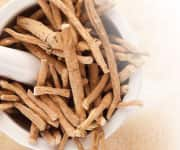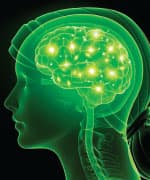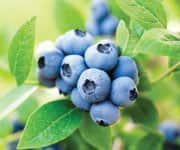Life Extension Magazine®
Ashwagandha has been used in traditional Indian medicine for thousands of years.1
Scientists have identified specific effects that ashwagandha has on brain activity.1-4
In human studies, ashwagandha intake:5,6
Lab studies show that it may also help protect against structural changes that can lead to Alzheimer's and other forms of dementia.7-10
A Staple of Ancient Medicine
Extracts of ashwagandha's roots and leaves contain a mixture of bioactive compounds, including withaferin A, withanolides, withanosides, and others.2
These compounds function as antioxidants and anti-inflammatory agents. They also act in other ways to protect the brain from disease.
They cross the blood-brain barrier and enter brain tissue, where they can exert beneficial actions.11,12
In healthy adults, ashwagandha taken daily has been shown to improve cognitive performance—with boosts in reaction time, discrimination, vigilance, and other tests of brain function.5
Relieving Anxiety and Depression

Nearly 10% of American adults suffer from mood disorders like anxiety, depression, and bipolar disorder in any given year.13
Stress and anxiety are often treated with drugs that stimulate the receptor for a neurotransmitter called GABA (gamma aminobutyric acid). These drugs have side effects, including fatigue and cognitive impairment.
Ashwagandha stimulates these same GABA receptors, without the side effects.14,15 Rather than causing fatigue or cognitive impairment, ashwagandha is known to enhance cognitive performance.5
Ashwagandha has long been used to reduce stress and support a healthy mood.14 A review of human trials found that it improved anxiety symptoms, compared to a placebo.6
In animal models of depression, ashwagandha extracts reverse signs of behavioral despair and other abnormalities and improve cognitive function.16-19
In two studies in rodents, the magnitude of this impact was comparable to the effects of imipramine and fluoxetine (Prozac®), two drugs used in humans to treat depression and other disorders.16,17
In patients with schizophrenia, who are prone to anxiety and depression, an ashwagandha extract reduced symptoms of both.20
Protecting Brain Cells
Ashwagandha may protect against various forms of dementia.
In laboratory studies of animal models of Alzheimer's disease, ashwagandha displays various mechanisms known to reduce its progression.
One of the primary features of Alzheimer's is the accumulation of an abnormal protein called beta-amyloid.
This buildup inflicts toxic effects on brain cells and incites aggressive chronic inflammation, which leads to further deterioration of brain function.
Preclinical studies have shown that ashwagandha:
- Reduces the formation of amyloid in the brain and brain cells,21,22
- Prevents the accumulation and aggregation of amyloid,23
- Reduces the toxic impact of existing amyloid, protecting brain cells from injury and inflammation, and21,22,24
- Aids in removing existing amyloid deposits, reversing Alzheimer's disease pathology.25
Animal models of Alzheimer's also show a drop in two key proteins associated with brain maintenance and repair: brain-derived neurotrophic factor (BDNF) and glial fibrillary acidic protein (GFAP). Ashwagandha helps maintain higher levels of both these protective proteins.26,27
Boosting Acetylcholine

One effect of memory loss caused by Alzheimer's disease is a loss of acetylcholine function.
Acetylcholine is a neurotransmitter used for cell-to-cell communication in the brain. It is vital to normal cognitive function.
Some medications used to treat Alzheimer's inhibit the enzyme that breaks down acetylcholine, boosting its levels. Ashwagandha also blocks this enzyme, increasing acetylcholine levels.8-10
Together, these actions suggest that ashwagandha could help fight some of the primary damage that is among the causes of Alzheimer's disease, while also supporting healthy brain function.
Ashwagandha has also shown promise in preclinical studies of other neurodegenerative diseases, including Parkinson's disease, amyotrophic lateral sclerosis (ALS), and Huntington's disease.1,2,28,29
Defense Against Neurotoxins
Ashwagandha has been found, in preclinical models, to shield against a range of neurotoxins, including lead, aluminum chloride, streptozotocin, scopolamine, kainic acid, and bisphenol A (BPA, a common additive in plastics).1,30,31
One example is glutamate. Glutamate is an amino acid that acts as a neurotransmitter in the brain. Normal levels of glutamate are vital to brain communication.4
What you need to know
Brain Benefits of Ashwagandha
- Ashwagandha is a plant native to India and surrounding parts of Asia. It has been used in traditional Indian medicine for millennia to promote overall health.
- Modern science has found that ashwagandha promotes healthy functioning of the brain.
- Extracts of ashwagandha may protect the brain from damage caused by a wide range of toxins, injuries, and stroke.
- Oral intake improves cognitive performance in healthy adults and in those with signs of cognitive decline.
- Ashwagandha reduces stress and anxiety, and relieves symptoms of depression.
- Research shows that ashwagandha may help protect against forms of dementia, including Alzheimer's disease.
But very high levels of glutamate can cause excitotoxicity—overstimulation of brain cells that can cause them to go haywire, and even die. Some brain injuries, such as traumatic head injuries and stroke, cause a huge release of glutamate that results in further cell death.4
Glutamate excitotoxicity has been found to be a component of the pathology seen in neurodegenerative disorders, such as Alzheimer's disease, Parkinson's disease, ALS, and multiple sclerosis.4
Ashwagandha defends the brain against this damage. In lab studies, pretreatment with ashwagandha extracts before exposure to high levels of glutamate markedly inhibit cell death and other changes associated with excitotoxicity.1,32,33
Helping Stroke Victims

The most common forms of stroke result from a lack of oxygen and blood to the brain, leading to cell dysfunction and death.
In several animal studies of experimental stroke, ashwagandha intake prevented much of this brain damage.34-38 It reduced the size of the brain injury and the biochemical changes that typically accompany stroke.
This helped prevent the behavioral, motor, and cognitive dysfunction that would otherwise have occurred.
These actions, along with its other benefits, make ashwagandha a powerful neuroprotective nutrient.
Summary
The herb ashwagandha has been used for its diverse health benefits for thousands of years.
Ashwagandha extract appears to be beneficial to the brain.
It may shield the brain from damage resulting from exposure to toxins, physical injury, and stroke.
It helps relieve stress and improves symptoms of anxiety and depression.
Ashwagandha also improves cognitive performance and may defend against cognitive decline and dementia.
Additional Brain-Boosting Nutrients

Sage
Researchers have identified a unique form of sage that improves cognitive function.
Clinical evidence demonstrated that this proprietary extract increased memory performance in older adults by nearly 60% and improved attention by 250%—within hours of ingestion.39
In addition to enhancing cognitive function in humans, this unique sage extract has been shown to increase lifespan by 12% in a C. elegans model of aging.40
Phosphatidylserine
Phosphatidylserine is a phospholipid, one of the structural components of the membranes that surround all cells in the body.41,42 This is especially critical for nerve cells in the brain, because it is their cell membranes that carry nerve impulses throughout the nervous system.43 The myelin that surrounds nerve fibers and aids signal conduction also relies on phosphatidylserine for normal structure and function.
Aging is associated with structural deterioration in the nervous system, which may be reduced by phosphatidylserine's ability to preserve cognitive function.

Blueberry
Blueberries are packed full of anthocyanins, powerful compounds that help protect the plant from oxidative stress. These compounds have been explored in the medical literature for years for their potential health benefits to humans.
Several recent trials in humans have demonstrated that blueberries enhance cognitive function. Not only has blueberry been found to enhance memory and other cognitive performance in older subjects, it improves mood and cognition in children and young adults as well.44-48
Pregnenolone
Pregnenolone, a hormone and hormone-precursor, as well as the derivatives it forms in the brain, have modulatory effects on nervous system function.
Several studies in animals and humans have reported beneficial effects for the brain.49
Pregnenolone appears to be a neuroprotectant, defending the brain from various forms of injury. It has also been found to have positive effects on mood, memory, and other aspects of cognition.
If you have any questions on the scientific content of this article, please call a Life Extension® Wellness Specialist at 1-866-864-3027.
References
- Dar NJ, MuzamilAhmad. Neurodegenerative diseases and Withania somnifera (L.): An update. J Ethnopharmacol. 2020 Jun 28;256:112769.
- Zahiruddin S, Basist P, Parveen A, et al. Ashwagandha in brain disorders: A review of recent developments. J Ethnopharmacol. 2020 Jul 15;257:112876.
- Ng QX, Loke W, Foo NX, et al. A systematic review of the clinical use of Withania somnifera (Ashwagandha) to ameliorate cognitive dysfunction. Phytother Res. 2020 Mar;34(3):583-90.
- Wadhwa R, Konar A, Kaul SC. Nootropic potential of Ashwagandha leaves: Beyond traditional root extracts. Neurochem Int. 2016 May;95:109-18.
- Pingali U, Pilli R, Fatima N. Effect of standardized aqueous extract of Withania somnifera on tests of cognitive and psychomotor performance in healthy human participants. Pharmacognosy Res. 2014 Jan;6(1):12-8.
- Pratte MA, Nanavati KB, Young V, et al. An alternative treatment for anxiety: a systematic review of human trial results reported for the Ayurvedic herb ashwagandha (Withania somnifera). J Altern Complement Med. 2014 Dec;20(12):901-8.
- Gautam A, Wadhwa R, Thakur MK. Involvement of hippocampal Arc in amnesia and its recovery by alcoholic extract of Ashwagandha leaves. Neurobiol Learn Mem. 2013 Nov;106:177-84.
- Grover A, Shandilya A, Agrawal V, et al. Computational evidence to inhibition of human acetyl cholinesterase by withanolide a for Alzheimer treatment. J Biomol Struct Dyn. 2012;29(4):651-62.
- Vinutha B, Prashanth D, Salma K, et al. Screening of selected Indian medicinal plants for acetylcholinesterase inhibitory activity. J Ethnopharmacol. 2007 Jan 19;109(2):359-63.
- Yadav CS, Kumar V, Suke SG, et al. Propoxur-induced acetylcholine esterase inhibition and impairment of cognitive function: attenuation by Withania somnifera. Indian J Biochem Biophys. 2010 Apr;47(2):117-20.
- Kumar G, Patnaik R. Exploring neuroprotective potential of Withania somnifera phytochemicals by inhibition of GluN2B-containing NMDA receptors: An in silico study. Med Hypotheses. 2016 Jul;92:35-43.
- Vareed SK, Bauer AK, Nair KM, et al. Blood-brain barrier permeability of bioactive withanamides present in Withania somnifera fruit extract. Phytother Res. 2014 Aug;28(8):1260-4.
- Available at: https://www.nimh.nih.gov/health/statistics/any-mood-disorder.shtml. Accessed March 31, 2021.
- Candelario M, Cuellar E, Reyes-Ruiz JM, et al. Direct evidence for GABAergic activity of Withania somnifera on mammalian ionotropic GABAA and GABArho receptors. J Ethnopharmacol. 2015 Aug 2;171:264-72.
- Singh G, Sharma PK, Dudhe R, et al. Biological activities of Withania somnifera. Ann Biol Res. 2010;1(3):56-63.
- Attari M, Jamaloo F, Shadvar S, et al. Effect of Withania somnifera Dunal Root Extract on Behavioral Despair Model in Mice: a Possible Role for Nitric Oxide. Acta Med Iran. 2016 Mar;54(3):165-72.
- Bhattacharya SK, Bhattacharya A, Sairam K, et al. Anxiolytic-antidepressant activity of Withania somnifera glycowithanolides: an experimental study. Phytomedicine. 2000 Dec;7(6):463-9.
- Jayanthi MK. Anti-depressant effects of withania somnifera fat (ashwagandha grutha) extract in experimental mice. Int J Pharm Bio Sci. 2012;3(1):33-42.
- Maity T, Adhikari A, Bhattacharya K, et al. A study on evalution of antidepressant effect of imipramine adjunct with Aswagandha and Bramhi. Nepal Med Coll J. 2011 Dec;13(4):250-3.
- Gannon JM, Brar J, Rai A, et al. Effects of a standardized extract of Withania somnifera (Ashwagandha) on depression and anxiety symptoms in persons with schizophrenia participating in a randomized, placebo-controlled clinical trial. Ann Clin Psychiatry. 2019 May;31(2):123-9.
- Atluri VSR, Tiwari S, Rodriguez M, et al. Inhibition of Amyloid-Beta Production, Associated Neuroinflammation, and Histone Deacetylase 2-Mediated Epigenetic Modifications Prevent Neuropathology in Alzheimer's Disease in vitro Model. Front Aging Neurosci. 2019;11:342.
- Pandey A, Bani S, Dutt P, et al. Multifunctional neuroprotective effect of Withanone, a compound from Withania somnifera roots in alleviating cognitive dysfunction. Cytokine. 2018 Feb;102:211-21.
- Jayaprakasam B, Padmanabhan K, Nair MG. Withanamides in Withania somnifera fruit protect PC-12 cells from beta-amyloid respon\sible for Alzheimer's disease. Phytother Res. 2010 Jun;24(6):859-63.
- Singh M, Ramassamy C. In vitro screening of neuroprotective activity of Indian medicinal plant Withania somnifera. J Nutr Sci. 2017;6:e54.
- Sehgal N, Gupta A, Valli RK, et al. Withania somnifera reverses Alzheimer's disease pathology by enhancing low-density lipoprotein receptor-related protein in liver. Proc Natl Acad Sci U S A. 2012 Feb 28;109(9):3510-5.
- Konar A, Shah N, Singh R, et al. Protective role of Ashwagandha leaf extract and its component withanone on scopolamine-induced changes in the brain and brain-derived cells. PLoS One. 2011;6(11):e27265.
- Sangiovanni E, Brivio P, Dell'Agli M, et al. Botanicals as Modulators of Neuroplasticity: Focus on BDNF. Neural Plast. 2017;2017:5965371.
- Dutta K, Patel P, Julien JP. Protective effects of Withania somnifera extract in SOD1(G93A) mouse model of amyotrophic lateral sclerosis. Exp Neurol. 2018 Nov;309:193-204.
- Rajasankar S, Manivasagam T, Surendran S. Ashwagandha leaf extract: a potential agent in treating oxidative damage and physiological abnormalities seen in a mouse model of Parkinson's disease. Neurosci Lett. 2009 Apr 17;454(1):11-5.
- Birla H, Keswani C, Rai SN, et al. Neuroprotective effects of Withania somnifera in BPA induced-cognitive dysfunction and oxidative stress in mice. Behav Brain Funct. 2019 May 7;15(1):9.
- Kumar P, Singh R, Nazmi A, et al. Glioprotective effects of Ashwagandha leaf extract against lead induced toxicity. Biomed Res Int. 2014;2014:182029.
- Kataria H, Wadhwa R, Kaul SC, et al. Water extract from the leaves of Withania somnifera protect RA differentiated C6 and IMR-32 cells against glutamate-induced excitotoxicity. PLoS One. 2012;7(5):e37080.
- Shah N, Singh R, Sarangi U, et al. Combinations of Ashwagandha leaf extracts protect brain-derived cells against oxidative stress and induce differentiation. PLoS One. 2015;10(3):e0120554.
- Baitharu I, Jain V, Deep SN, et al. Withanolide A prevents neurodegeneration by modulating hippocampal glutathione biosynthesis during hypoxia. PLoS One. 2014;9(10):e105311.
- Chaudhary G, Sharma U, Jagannathan NR, et al. Evaluation of Withania somnifera in a middle cerebral artery occlusion model of stroke in rats. Clin Exp Pharmacol Physiol. 2003 May-Jun;30(5-6):399-404.
- Mukherjee S, Kumar G, Patnaik R. Withanolide a penetrates brain via intra-nasal administration and exerts neuroprotection in cerebral ischemia reperfusion injury in mice. Xenobiotica. 2020 Aug;50(8):957-66.
- Sood A, Kumar A, Dhawan DK, et al. Propensity of Withania somnifera to Attenuate Behavioural, Biochemical, and Histological Alterations in Experimental Model of Stroke. Cell Mol Neurobiol. 2016 Oct;36(7):1123-38.
- Sood A, Mehrotra A, Dhawan DK, et al. Indian Ginseng (Withania somnifera) supplementation ameliorates oxidative stress and mitochondrial dysfunctions in experimental model of stroke. Metab Brain Dis. 2018 Aug;33(4):1261-74.
- Scholey AB, Tildesley NT, Ballard CG, et al. An extract of Salvia (sage) with anticholinesterase properties improves memory and attention in healthy older volunteers. Psychopharmacology (Berl). 2008 May;198(1):127-39.
- Sibelius. Internal Report. ChronoscreenTM Analysis: Cognition Enhancing Drugs & Natural Extracts. 2018.
- Available at: https://www.drugbank.ca/drugs/DB00144. Accessed April 1, 2021.
- Glade MJ, Smith K. Phosphatidylserine and the human brain. Nutrition. 2015 Jun;31(6):781-6.
- Available at: https://www.ncbi.nlm.nih.gov/books/NBK27954/. Accessed April 1, 2021.
- Whyte AR, Cheng N, Fromentin E, et al. A Randomized, Double-Blinded, Placebo-Controlled Study to Compare the Safety and Efficacy of Low Dose Enhanced Wild Blueberry Powder and Wild Blueberry Extract (ThinkBlue) in Maintenance of Episodic and Working Memory in Older Adults. Nutrients. 2018 May 23;10(6).
- McNamara RK, Kalt W, Shidler MD, et al. Cognitive response to fish oil, blueberry, and combined supplementation in older adults with subjective cognitive impairment. Neurobiol Aging. 2018 Apr;64:147-56.
- Whyte AR, Schafer G, Williams CM. Cognitive effects following acute wild blueberry supplementation in 7- to 10-year-old children. Eur J Nutr. 2016 Sep;55(6):2151-62.
- Miller MG, Hamilton DA, Joseph JA, et al. Dietary blueberry improves cognition among older adults in a randomized, double-blind, placebo-controlled trial. Eur J Nutr. 2018 Apr;57(3):1169-80.
- Khalid S, Barfoot KL, May G, et al. Effects of Acute Blueberry Flavonoids on Mood in Children and Young Adults. Nutrients. 2017 Feb 20;9(2).
- Vallee M. Neurosteroids and potential therapeutics: Focus on pregnenolone. J Steroid Biochem Mol Biol. 2016 Jun;160:78-87.

